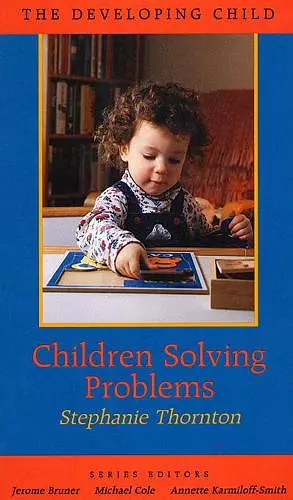Children Solving Problems
Format:Paperback
Publisher:Harvard University Press
Published:13th Aug '98
Currently unavailable, and unfortunately no date known when it will be back

A one-year-old attempting to build a tower of blocks may bring the pile crashing down, yet her five-year-old sister accomplishes this task with ease. Why do young children have difficulty with problems that present no real challenge to older children? How do problem-solving skills develop? In Children Solving Problems, Stephanie Thornton surveys recent research from a broad range of perspectives in order to explore this important question.
What Thornton finds may come as a surprise: successful problem-solving depends less on how smart we are—or, as the pioneering psychologist Jean Piaget claimed, how advanced our skill in logical reasoning is—and more on the factual knowledge we acquire as we learn and interpret cues from the world around us.
Problem-solving skills evolve through experience and dynamic interaction with a problem. But equally important—as the Russian psychologist L. S. Vygotsky proposed—is social interaction. Successful problem-solving is a social process. Sharing problem-solving tasks—with skilled adults and with other children—is vital to a child’s growth in expertise and confidence. In problem-solving, confidence can be more important than skill.
In a real sense, problem-solving lies at the heart of what we mean by intelligence. The ability to identify a goal, to work out how to achieve it, and to carry out that plan is the essence of every intelligent activity. Could it be, Thornton suggests, that problem-solving processes provide the fundamental machinery for cognitive development? In Children Solving Problems she synthesizes the dramatic insights and findings of post-Piagetian research and sets the agenda for the next stage in understanding the varied phenomena of children’s problem-solving.
[There is] much of value about Thornton’s book. In particular, not only does it meet the aim of providing an accessible outline of a major strand of contemporary thinking, but it does so in a manner likely to inspire considerable enthusiasm and interest in its readers. -- A. Tolmie * British Journal of Developmental Psychology *
In this short, clearly written book, Thornton synthesizes literature in post-Piagetian research to consider the development of children’s problem solving capacities. She suggests that there are multiple variables that contribute to the ease with which children solve problems and the sophistication of the strategies they employ. * Harvard Educational Review *
The synopsis of research since the 1970s provided here constitutes a valid challenge to Piaget’s theory that the development of logical skills is fundamental to the ability to solve problems. * Readings *
This small, thoughtful volume takes its place with others of similarly high quality in the Developing Child series. * Science Books & Films *
ISBN: 9780674116245
Dimensions: unknown
Weight: 181g
154 pages